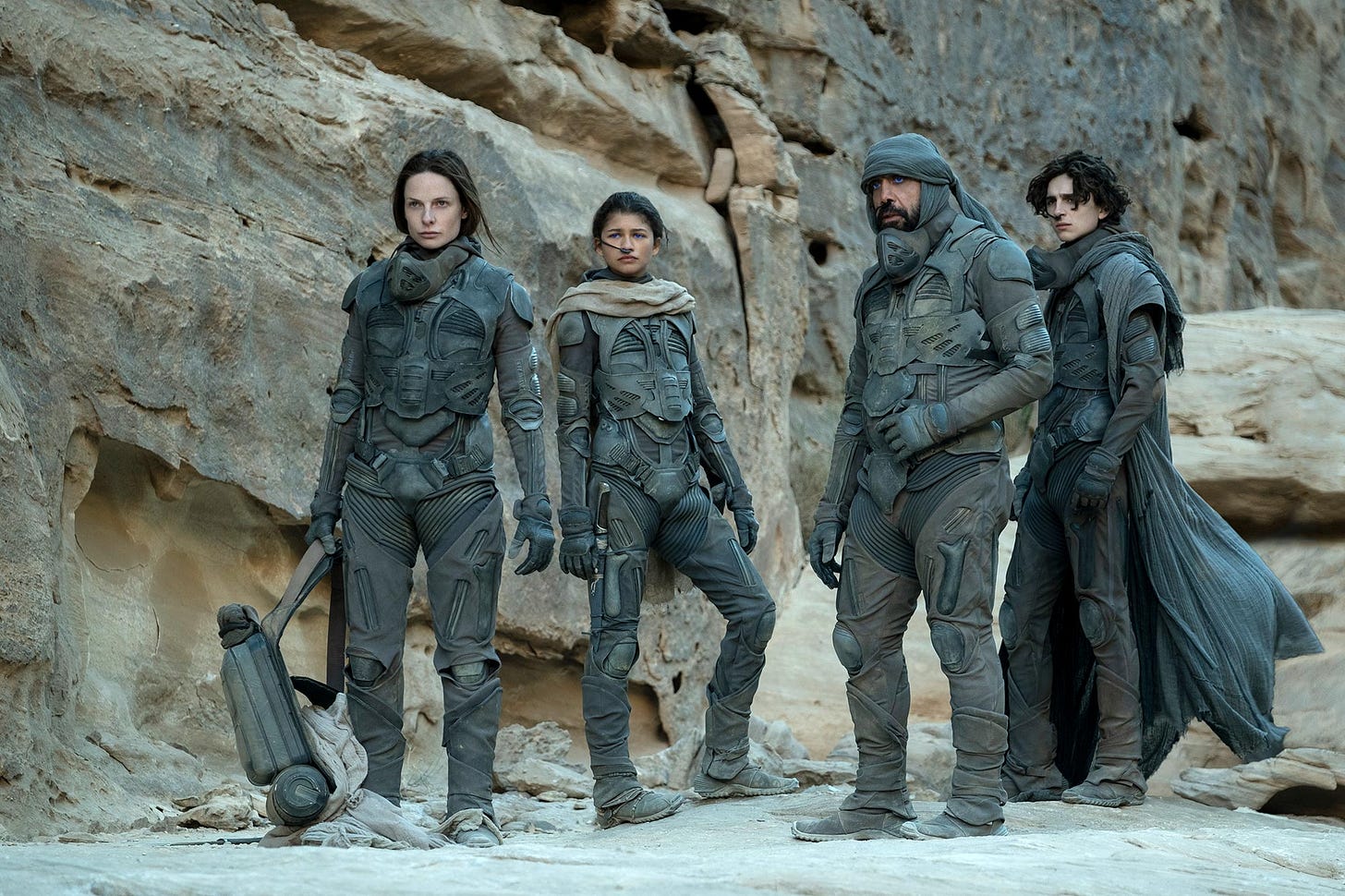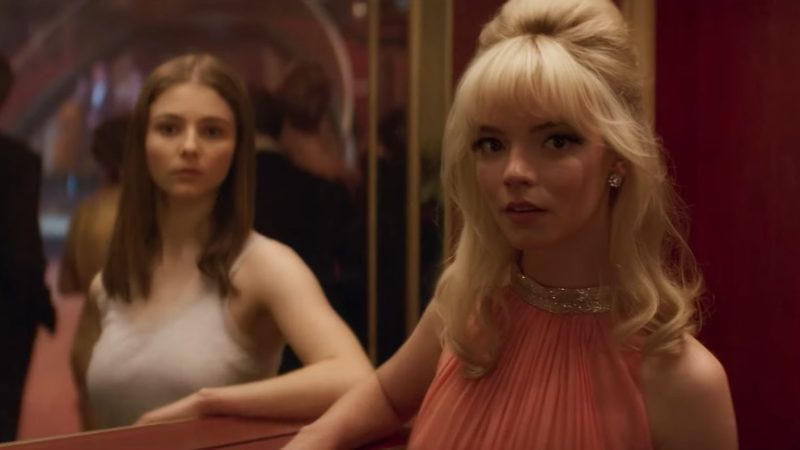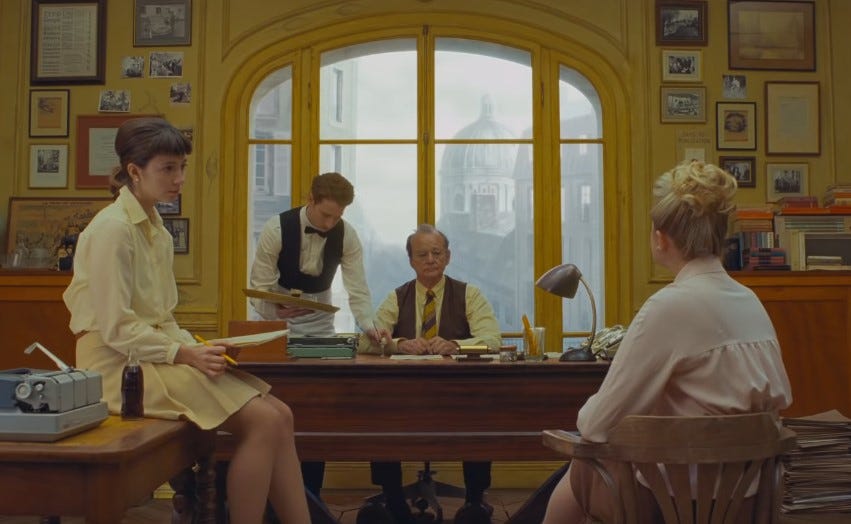150th Edition! 'Dune,' 'Last Night in Soho,' 'The French Dispatch'
#150: "Dune," "Last Night in Soho," "The French Dispatch"
Edition 150:
Hey movie lovers!
As always, you can find a podcast version of this newsletter on Apple or Spotify. Thank you so much for listening and spreading the word!
In this week’s newsletter: We’ve really done 150 of these movie newsletters now?! Where has the time gone. There’s a kind of beautiful symmetry to be talking about Denis Villeneuve’s new movie Dune this week, since the very first movie edition covered Sicario: Day of the Soldado, a sequel to Villeneuve’s incredible drug war thriller. The hits keep coming in No. 150 with reviews of new movies from two of my favorite directors, Edgar Wright and Wes Anderson.
All three of this week’s entries ranked in my top 15 of 2021 so far. With many good releases still to come, here’s a look at those rankings:
CODA
Promising Young Woman
Judas and the Black Messiah
Mass
Nomadland
The Father
Dune
Last Night in Soho
The Last Duel
In The Heights
Untold: Breaking Point
Monster
Nobody
Pig
The French Dispatch
Dune
(Theaters, HBO Max)
There was a period in my childhood, long before I started watching or caring a lot about movies, when my favorite movie of all time was Avatar. I’m only slightly embarrassed to admit that now.
I went to it three times in theaters (a record only topped many years later by La La Land x5, a story for a different time), driven by the same fascination that captivated audiences years earlier with Titanic, and before that Star Wars, Jaws, 2001: A Space Odyssey, back to The Ten Commandments and Ben-Hur. Every generation has their giant spectacle movie, which redefines what a movie can be and pushes the ceiling a little higher on what they’re capable of achieving.
Dune carries that legacy now (taking the belt, mercifully, from Avengers: Endgame). To see this movie is to be humbled by its overwhelming audiovisual experience, quite literally awe-ing viewers into submission — if ever there were a movie to see on the biggest theater screen possible, it is this. Nothing has ever been done on this scale before, and never with this level of artistry.
It’s important to make the distinction between the grandiose terms used so far and a simple evaluation of the movie’s merits. The simple fact is none of the previous belt-holders mentioned here were “great” stories (except for Jaws). Dune is a messianic sci-fi story, based on a book that predates and certainly sets the pattern for the likes of Star Wars and Blade Runner and all those that came after, but can hardly be called original when you consider Joseph Campbell’s hero’s journey and that little old indie bestseller called The Bible.
The hero is played by Timothée Chalamet, an actor who is his own sort of messiah to this dying era of moviestardom. He is the chosen one, as is his character, matching royal charisma with magical powers if only he can realize his potential and bring balance to the Force—…err wait, hold on, got my identical storylines mixed up. Bring peace to the empire! That’s it.
Where director Denis Villeneuve deserves enormous credit, aside from coordinating hundreds upon hundreds of crew members to create some of the most unforgettable large scale movie moments in many years, is introducing casual viewers like myself to a massive mythology of an entire galaxy without feeling too burdensome.
Sure, the first half of the movie leaks exposition like a sieve, explaining the geopolitics of the various houses and races, explaining the magic, and introducing no less than 20 characters, but anyone who watched early seasons of “Game of Thrones” or suffered through disasters like Valerian and the City of a Thousand Planets can appreciate the economy and style with which Villeneueve unfurled his guide book.
The simplicity of the familiar storyline helps with that shorthand, and in classic blockbuster style a viewer doesn’t really have time to figure out what’s going on in the big picture because each immediate moment is so propulsive and urgent. It’s always RUN-FIGHT-GET TO THE SHIP-FLY AWAY-OH NO OUT OF GAS and on and on and on until eventually hero fights big bad and then it ends.
The only difference here is a lack of resolution, because this 2 hour and 35 minute movie is only HALF of the first “Dune” book. If ever there was an example of movies becoming TV, it’s Warner Brothers dropping close to half a Billion on basically an unresolved pilot episode.
That money did buy an absolute gluttony of acting talent — Oscar Isaac, Josh Brolin, Zendaya, Javier Bardem, Rebecca Ferguson, Stellan Skarsgard, Jason Mamoa, Dave Bautista, Charlotte Rampling — plus some of the greatest CGI I’ve ever seen.
Which is why being “good” is almost entirely besides the point. Movies at this scale are measured in “works” or “doesn’t work” and in this case Dune really works. It’s a financial and critical success, not entirely marked as a win in the “dramas for adults” column but tipping enough toward respectability that the Academy Awards would be very foolish not to reward it.
Regardless, you’re not going to want to miss this cultural touchstone. And listen…I know it’s available on HBO Max, and that’s super easy, but it’s almost not even worth watching without that giant screen and the surround sound. Just trust me on this one.
Last Night in Soho
(Theaters)
The trailer for Last Night in Soho fell into my White Boy Rick theory of actually being TOO good. The swingin’ 60s nostalgia noir set to Anya Taylor-Joy’s silky vocals from the trailer looked incredible but turned out to be a pretense set up to be destroyed as the movie progresses, an excellent but entirely different experience than the expectation created by the movie’s marketing.
Taylor-Joy’s vocals are still present, and still silky. She becomes the embodiment of that bygone era for our point of view character (played well by Thomasin McKenzie, best known from JoJo Rabbit), who escapes present day London in her dreams each night to live out the woman’s parallel life in the same SoHo neighborhood some 60 years earlier.
The sweeping visuals and period production design are incredible here in a much more grounded and practical way than Dune, but are just as arresting. The dazzling neon lights and red velvet jazz clubs give way to damp and dark streets and fedoras, tracked around in long unbroken shots with precise choreography.
For someone as prone to nostalgia as me, for a past I never experienced and which never actually existed in the glossy, exciting form I imagine in my mind’s eye, the narrative thrust of the movie was very effective.
The lesson here is that nostalgia is dangerous, because distortion leads to a sort of betrayal of the mind.
Our heroine’s visions of the past go from nirvana to nightmare, as the harsh realities of the time period catch up with her surrogate. She goes from wanting to be the woman in her dreams to trying desperately to escape her.
That’s when the movie turns sharply toward something resembling horror, even including a handful of jump scares. It means less time spent in the 60s world (shame!), and like a lot of vibe-forward movies there’s some momentum lost when you have to get to the actual meat of the story, but it produces some nice twists on the way to a fairly satisfying ending.
Simply put, Edgar Wright belongs on that short list of directors who you can just blindly trust to create something awesome. He’s quickly rising on my list of favs, having already done Scott Pilgrim vs. The World, Shaun of the Dead and Baby Driver, and now he’s shown he’s just as good with horror as he is with action and comedy.
It’s a shame this movie is going to be buried at the box office by Dune and this weekend’s Eternals, because it’s built to be a popcorn hit, accessible to anyone who is a fan of the great psychological thrillers of the past. Or wait…were those psychological thrillers of the past actually great??
The French Dispatch
(Theaters)
Dismissing one of the foremost masters of moviecraft with adjectives like “whimsical” or “twee," the latter in an attempt to cleverly comment on the man’s frequent wardrobe of tweed suits, seems pretentious and entirely missing the point.
What Wes Anderson is, unabashedly, is himself. Perhaps more than any other director, a viewer can identify a movie (The Grand Budapest Hotel, The Royal Tenenbaums, A Life Aquatic with Steve Zissou) as one of his almost instantly — his symmetric framing, precise camera movement and quirky production design are one of a kind.
He leans all the way into his signature style in his latest project, an anthology movie about a thinly fictionalized New Yorker magazine set in a thinly fictionalized French town. The movie is divided into magazine sections (short, punchy stories up front, features in the middle and a sentimental send-off at the end), with voiceover coming in the customary cadence of high literature.
The union makes sense. A magazine is nothing more than a curated worldview, and a subscription just an aspirational exercise in identity. So with this movie, like a magazine, you’re either in or you’re out.
Of course, I’m all the way in. Anderson is one of my favorite directors and magazines are my dream job. This world is fully realized and immaculately rendered, from the story about a prisoner who paints abstract art masterpieces of his muse/cell guard, to a student revolution settled over games of chess, to a profile of a police chef who becomes the key figure in a high stakes heist, all of the mini-tales are wonderfully Wes.
Admittedly, the stories are short and mostly ridiculous, the characters as a result remain quite broad, and the storytelling cares little for complexity. The movie instead flies by like a theme park ride, asking its viewers to forego a deep understanding and surrender to the overwhelmingly impressive filmmaking, wrapping each segment in a Russian nesting doll of framing devices and aesthetics — at one point transforming into full-on animation for an entire action sequence.
The fragmented narrative allows for upwards of 30 or more beloved actors, casually casting the likes of multiple-time Oscar nominees (Ed Norton, Saoirse Ronan) and multiple-time Emmy winners (Elisabeth Moss, Liev Schriber) as characters with no name and 2-3 lines of dialogue. A quick count says at least five Oscar winners (Frances McDormand, Benicio Del Toro, Adrien Brody, Tilda Swinton, Christoph Waltz) in the bunch, adding to the feeling that each frame is overstuffed with stimulation and often the most interesting thing may be happening in the background.
So if you’re willing to jump aboard the Wes Anderson train, maybe we’ll call it the Twee Express, then you’re in for a wild ride to France-via-New-Yorker.
Trailer Watch: The Power of the Dog
The Oscars: Why does nobody watch our show anymore? Why does no one care about us?
Dune: People might tune in if you reward this generation’s Star Wars…
The Oscars: Ooooh wait this movie has Benedict Cumberbatch on a horse WITH a western accent? That’s our odds-on favorite.
Dune: I’m literally starring this generation’s Leo DiCaprio.
The Oscars: Ok but Jessie Plemens and Kirsten Dunst!
Dune: Oscar Isaac, Josh Brolin, Javier Bardem, Rebecca Ferguson, Zendaya, Jason Mamoa…
The Oscars: Nah, it’s time for Jane Campion to get recognized, one of this generation’s great filmmakers.
Dune: Her most successful movie made $23 million total. I’m already over $300 million!
The Oscars: Alright, guess we’ll have to give Best Picture to Belfast.



